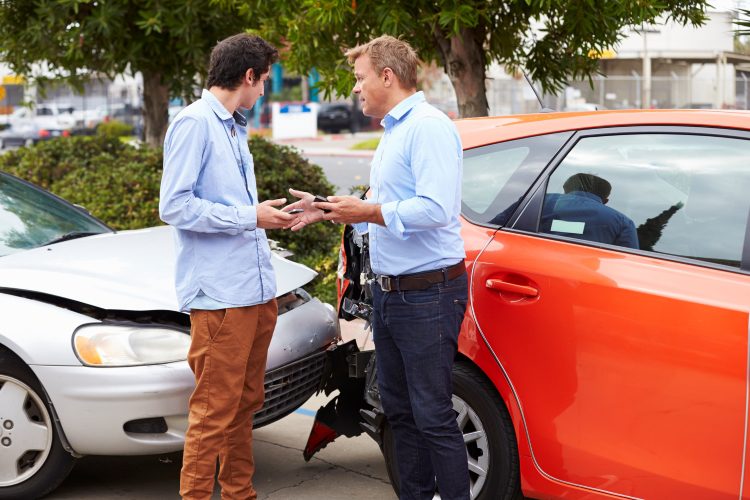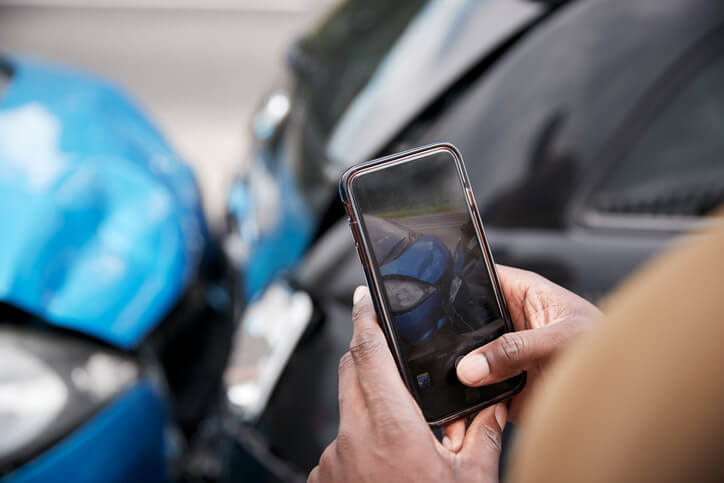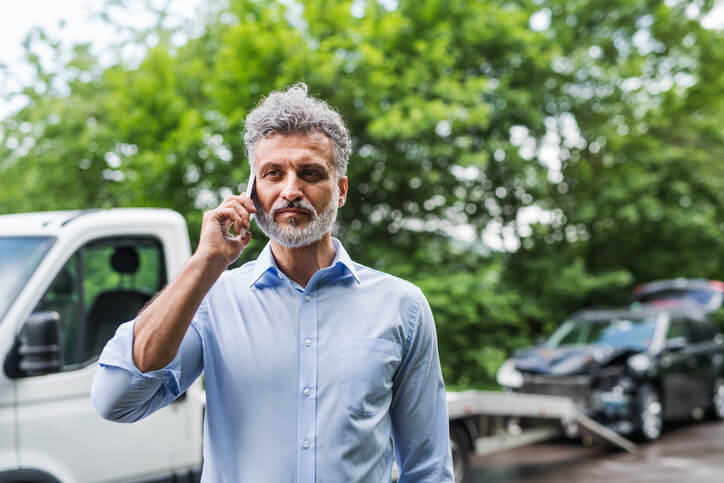In a Car Crash? Here’s What to Do After a Car Accident

AutoCar Insurance
Published: February 13, 2017
Updated: August 10, 2023
Picture yourself driving down the highway. You’re focusing on the cars in front of you when suddenly the driver next to you swerves. They crash into your vehicle, which then veers into a third car. Or you’re backing out of a parking space when another driver absent-mindedly slams right into the rear of your car. Or you’re at a stop light when your foot slips off the brake pedal. You roll forward, tapping the car in front of you. Do you know what to do after a car accident?
Every car crash is different. In any crash situation, what you do after an accident can have as much impact as the collision itself. Knowing how to handle the aftermath of an accident can help you avoid additional stress during an already difficult moment. Here’s what to do immediately after a crash.
Stay at the Scene After a Car Accident
Regardless of whether you are at fault, the same procedures are the same after a crash. All drivers involved have to abide by relevant laws. For example, never leave the scene of an accident. It can be considered a “hit and run” if you do leave the scene of the accident. Aside from being irresponsible, it’s also illegal in most places. Depending on the circumstances and location of the crash, leaving the scene of an accident can be a traffic infraction, a misdemeanor or even a felony, with legal repercussions to match.
Unless someone was driving under the influence, is behaving erratically, or otherwise gives the authorities a reason to arrest or detain them, all drivers will be free to leave after the situation has been appropriately dealt with.
Injuries After a Car Accident
If you or your passengers are injured, call 911 or have someone do it for you. If you’re not injured, check on the other driver and passengers involved in the crash. Seek medical attention for them right away if needed.
Minor Car Accidents
If the accident is minor, pull over as soon as you can do so safely. Assess the damage to the vehicles, if any, and exchange information with the other driver. In most cases, all drivers involved will report a claim to their insurance company, but you don’t have to.
If there are no injuries and the damage is minimal, you may want to take care of the repairs yourself without involving the car insurance companies or the police. If one driver is clearly at fault, they may offer to reimburse the other driver for the cost of the repairs. Before you decide whether to file an insurance claim, consider that what might seem like small damage at first glance may turn out to be something more serious.
Although there is usually no need to report a very minor accident (unless local law demands it), if you believe the accident was the fault of the other driver, or no one’s fault, call the police* to have them put together a report. Having that official report can help your case in a dispute. And if the other driver is behaving aggressively or strangely, don’t hesitate to call the police.*Note that in many areas, the police may not respond to an accident that occurs on private property if no one was injured.
Serious Car Accidents
Even if there are no injuries, call for emergency assistance if any of the vehicles involved are seriously damaged or if there are any signs of a car fire.
If it is safe and possible to drive your vehicle, move it to the side of the road or another less dangerous location nearby.
If you cannot move your car, or if you and the others are standing at the side of a busy road, try to stay calm and be as cautious as possible while waiting for the police to arrive. After a car accident, passengers and vehicles are at risk for being struck again by passing cars. Keep your hazard lights on and if you have cones or flares on hand, use them.
Beware of Towing Scams After a Car Accident
Unfortunately, car accidents and other times of crisis may encourage scammers to take advantage so they can make a profit. If you’re involved in a serious car accident, typically you or the police will call a tow truck company to bring your vehicle to a nearby auto repair shop or other facility. However, the National Insurance Crime Bureau (NICB) warns of potential tow truck scams. In these cases, tow truck operators will arrive to the scene even though they weren’t called and offer to tow your vehicle. They typically charge exorbitant towing fees and bring cars to dishonest repair shops. Once your vehicle is at one of these facilities, scammers can hold it hostage until a large insurance company payment is made.
The NICB has identified cities like Chicago and Philadelphia as some of the “most problematic” locations for towing-related scams, but these situations can happen anywhere.
To avoid tow truck scams, the NICB recommends taking the following steps to protect yourself:
Do not give permission for an unsolicited tow truck driver to move your vehicle. Reputable towing companies will never show up to the scene of the accident without being called first.
Do not provide tow truck operators with your personal information. This includes your insurance and personal lien holder information.
Ask for identification. Look for signage on the tow truck and make sure it matches any documentation the company provides you.
If you’re questioning the operator’s legitimacy, notify the police. If something doesn’t seem right, it probably isn’t.
You should only give tow truck companies permission to move your vehicle after they have provided you with:
A printed list that outlines storage fees and other charges. If the prices seem too high, ask your insurance company or the police to contact another towing operator.
Documentation that shows where your car is being towed. This is especially important if the facility isn’t one that you selected.
Document Damage After a Car Accident

When it’s safe for you to do so, document the damage to your car, and, if possible, the accident scene. If you can, take photos and write down what happened in as much detail as you remember. Consider drawing a diagram of the accident scene. Your insurance company may have a mobile app that lets you record the details of the accident and the damage to your car. The app can also help you begin the process of reporting the claim.
If you’re not able to document the details of the crash right away, do so as soon as you can. Even the smallest details that are fresh in your mind soon after an accident might be relevant when you describe the incident to your insurance representative. You will also be glad you’ve recorded this information if the other driver ends up disputing your version of events down the line.
Exchange Information After a Car Accident
When exchanging information with the other driver involved in the crash, you’ll have to provide details like your:
Name
Insurance company
Policy number
Vehicle’s license plate number
In the United States, the amount of information you must share varies by state. This is also true of other legal requirements for drivers in car accidents. For example, some states require drivers to file a report with the Department of Motor Vehicles if there is no police report or if the damage to a vehicle exceeds a specified amount.
What Not to Say After a Car Accident
At the accident scene, don’t discuss the details of the accident with anyone aside from the police or other authorities. Don’t admit fault, even if you think you might have caused the accident, unless you are choosing to handle a very minor and clear-cut incident (e.g., you bumped into and scratched a parked car) with the other driver privately.
When you file a claim, you can discuss the event in detail with representatives from your insurance company and, if it comes to it, the lawyers they assign to your case.
Reporting a Claim After a Car Accident

To file a claim, you can contact your insurance company online, by phone or via their mobile app. You’ll speak with a representative who will ask you to describe, in detail, the circumstances of the accident. They will also want to know about any injuries or damage to the vehicles involved. You may have the opportunity to submit your own photos of the damage using a guided online tool. These photos help start the process of documenting vehicle damage.
Your insurance company will represent you in any dealings with the other driver or their respective insurance companies. They can also help you as you navigate the post-accident process by answering your questions and assisting with tasks. Your insurance company can provide guidance where to have your car repaired or renting a replacement vehicle.
Even the best, most careful motorists can meet with bad luck—and bad drivers. So although it’s frightening to contemplate being in an accident, it’s a good idea to prepare for the possibility. In addition to researching what to do in case of a crash, it’s also helpful to know the laws of the jurisdictions where you drive. You should also review what your auto insurance policy covers. Like being a good driver, keeping yourself aware and informed will help you stay safe on the road.
What causes traffic jams and car crashes? Learn what dangerous driving habits contribute to traffic jams and car crashes. Find out how you can avoid them to reduce your likelihood of having an accident.
This article provided by The Hartford Insurance, a Bolder Insurance partner.






